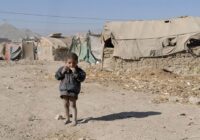On May 6, 2024, Denmark’s capital of Copenhagen became the site for the Copenhagen High-Level Migration Conference, an international hearing on asylum and immigration. It was attended by over 250 delegates, including ministers and representatives from international bodies like the United Nations High Commissioner for Refugees (UNHCR) and the International Organization for Migration (IOM).
Kaare Dybvad, the Minister of Immigration and Integration and the conference’s principal organizer, articulated the main goal of fostering “sustainable solutions” for EU asylum policy future plans, that should spark transnational collaborations with third countries — countries outside the EU. Essentially, this involves delegating the management of spontaneous asylum seekers to non-Schengen partners outside the EU, where their applications would be processed in EU member countries’ funded reception centers.
Notably, the interior ministers from Italy, Austria, the Czech Republic and the Netherlands were among the prominent participants at the conference. They represent administrations with right-wing and predominantly EU-skeptical views.
Danish Prime Minister Mette Frederiksen inaugurated the conference with a stark critique of the prevailing EU immigration and asylum frameworks, labeling them “dysfunctional.” Drawing parallels with the 2015 crisis, she underscored that the recently ratified EU Pact on Migration and Asylum sets the groundwork for substantial reforms, but is not enough on its own. She advocated for expanded, robust agreements to enhance further international cooperation with third countries and forge more enduring solutions.
“Policy learning” and Italy and Albania’s risky plan
A clear aim of the conference was to foster “policy learning” practices among participants. Italy, led by right-wing Prime Minister Giorgia Meloni, serves as an example for other European leaders to follow.
The Italian government and Albania, led by Prime Minister Edvin Rama, have negotiated a five-year asylum deal. The plan is to build asylum processing facilities under Italian jurisdiction in Albania. They will receive asylum seekers coming via the Mediterranean route, and accelerate processing and repatriation of those whose asylum is declined.The plans are now already in the implementation phase.
By financing and remaining in control of these facilities, the Italian government aims to sidestep potential breaches of international conventions. The Rwanda plans promoted by Denmark and the UK have in fact faced difficulties due to international conventions that prohibit deporting asylum seekers to countries where their fundamental rights cannot be assured.
The Italian–Albanian contract highlights however the high costs of outsourcing asylum processes. They are projected at a minimum of €30 million (over $32 million) annually for basic operational expenses, with total costs far surpassing the initial estimate of €650 million (over $694 million). These financial burdens necessitated substantial cuts in other critical public welfare areas, such as education, health, public transport.
Several factors underscore the major costs, precariousness and inadequacy of such agreements. The contract is rather ambiguous. It will be difficult to monitor the centers’ humanitarian conditions, and there are high risks of corruption during the construction and management of the facilities. Additionally, political instability in Albania might cause the country to withdraw from the contract altogether.
The Social Democrats on asylum outsourcing
But with Rome and Tirana’s plan in the background, the Copenhagen event served as a strategic platform for Denmark to re-propose its contentious scheme to transfer asylum seekers to a non-Schengen third country. The plan was influenced by similar initiatives in the UK that faced legal rejection from the Supreme Court over concerns of refoulement and severe violations of international law. It was previously negotiated in Rwanda in 2021, under a preliminary agreement by former Immigration Minister Mattias Tesfaye and Rwandan Foreign Minister Manasseh Nshuti. The plan followed the legislative changes to the Immigration and Repatriation Acts endorsed by the Danish Social Democrats (SD) and right-wing parties in June 2021. It has now stalled.
The conference signaled a reinvigorated attempt by the Danish SD and representatives of other EU countries to discuss and explore joint strategies for externalizing asylum reception and processing. This approach reflects a broader policy trend among EU right-wing populist and conservative governments; they commend the SD asylum model and recommend its replication and expansion. Additionally, the European Parliament elections, which tilted the political spectrum further to the right, suggest these viewpoints may gain prominence over the next five years.
Politicians are increasingly discussing and employing the outsourcing of asylum processing to third countries, but the practice raises significant humanitarian, economic, legal and political concerns. The great financial burden and potential political instability in these countries underscore the risks of such approaches. These factors cast serious doubt on the viability and long-term sustainability of these so-called solutions to asylum. They also suggest a strategic turn by the Danish SD towards more neoconservative and nativist right-wing positions, influenced by electoral dynamics and dissatisfaction among certain voter groups.
This shift also raises vital questions about the compatibility of such policies with established EU democratic and humanitarian values and the core ideals of social democracy. The Danish SD’s decision not to endorse the Party of European Socialists (PES) Berlin Declaration, which commits to resisting far-right influences in the European Parliament, marks a transformation within the party. It could exacerbate differences within the broader European political family.
[Lee Thompson-Kolar edited this piece.]
The views expressed in this article are the author’s own and do not necessarily reflect Fair Observer’s editorial policy.
Support Fair Observer
We rely on your support for our independence, diversity and quality.
For more than 10 years, Fair Observer has been free, fair and independent. No billionaire owns us, no advertisers control us. We are a reader-supported nonprofit. Unlike many other publications, we keep our content free for readers regardless of where they live or whether they can afford to pay. We have no paywalls and no ads.
In the post-truth era of fake news, echo chambers and filter bubbles, we publish a plurality of perspectives from around the world. Anyone can publish with us, but everyone goes through a rigorous editorial process. So, you get fact-checked, well-reasoned content instead of noise.
We publish 2,500+ voices from 90+ countries. We also conduct education and training programs
on subjects ranging from digital media and journalism to writing and critical thinking. This
doesn’t come cheap. Servers, editors, trainers and web developers cost
money.
Please consider supporting us on a regular basis as a recurring donor or a
sustaining member.
Will you support FO’s journalism?
We rely on your support for our independence, diversity and quality.








Comment